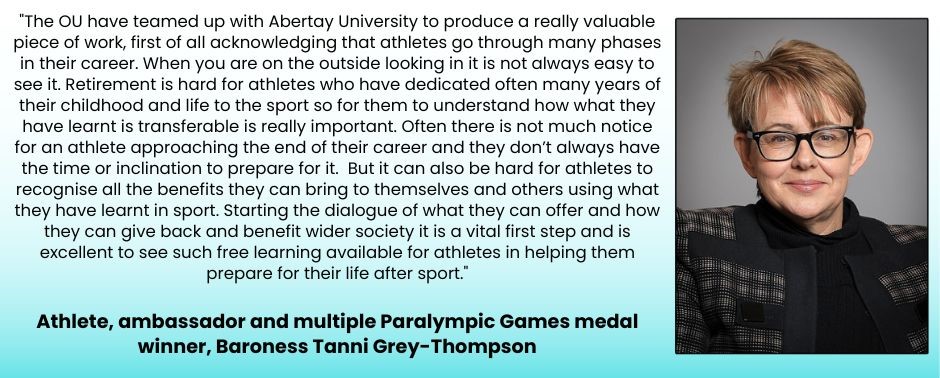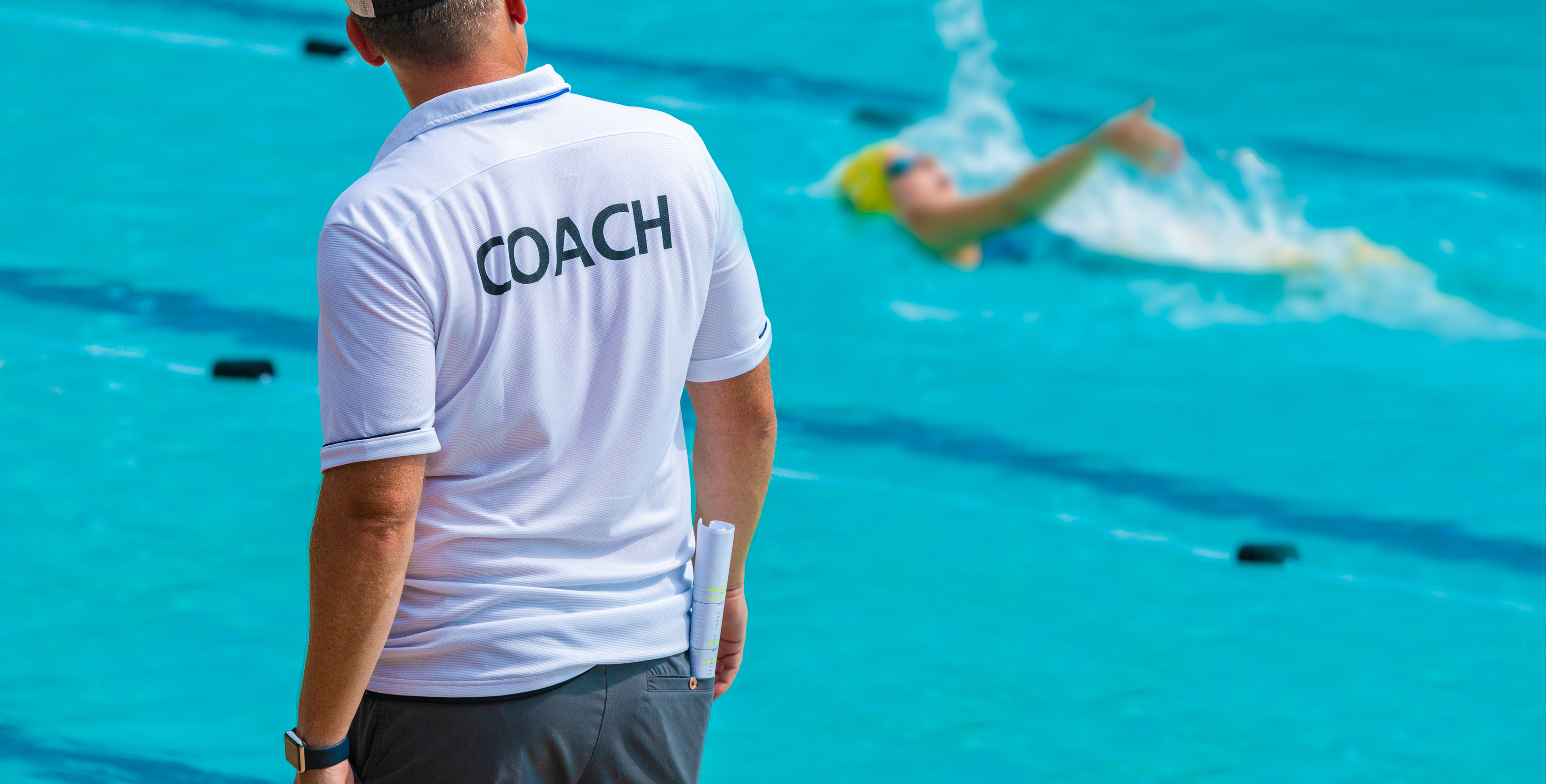This content is associated with The Open University's Sport and Fitness courses and qualifications.
 "The OU have teamed up with Abertay University to produce a really valuable piece of work, first of all acknowledging that athletes go through many phases in their career. When you are on the outside looking in it is not always easy to see it. Retirement is hard for athletes who have dedicated often many years of their childhood and life to the sport so for them to understand how what they have learnt is transferable is really important. Often there is not much notice for an athlete approaching the end of their career and they don’t always have the time or inclination to prepare for it. But it can also be hard for athletes to recognise all the benefits they can bring to themselves and others using what they have learnt in sport. Starting the dialogue of what they can offer and how they can give back and benefit wider society it is a vital first step and is excellent to see such free learning available for athletes in helping them prepare for their life after sport."
"The OU have teamed up with Abertay University to produce a really valuable piece of work, first of all acknowledging that athletes go through many phases in their career. When you are on the outside looking in it is not always easy to see it. Retirement is hard for athletes who have dedicated often many years of their childhood and life to the sport so for them to understand how what they have learnt is transferable is really important. Often there is not much notice for an athlete approaching the end of their career and they don’t always have the time or inclination to prepare for it. But it can also be hard for athletes to recognise all the benefits they can bring to themselves and others using what they have learnt in sport. Starting the dialogue of what they can offer and how they can give back and benefit wider society it is a vital first step and is excellent to see such free learning available for athletes in helping them prepare for their life after sport."
These challenges are explored in detail in the Badged Open Course (BOC) The athlete’s journey: transitions through sport, but the transition commonly has a negative psychological impact and can be associated with mental health difficulties (Moesch et al., 2018).
For an athlete who has a strong athletic identity (i.e., someone who views themself predominantly as an athlete) the prospect of developing a new identity outside of the familiar ‘competitive athlete’ role after retirement can be daunting, but as we will discuss in this article, athletes hold a range of transferable skills that can make negotiating a new identity an exciting and rewarding time. Life after sport can also provide athletes with an opportunity to ‘give back’ to wider society.
Being an athlete often requires an inherent amount of selfishness (e.g., prioritising one’s own needs above those of others). Retirement and life after sport therefore provide an opportunity for the athlete to recompense and give back to others in a variety of ways, which in turn can benefit the athlete. In this article we explore the concept of athletes giving back to society, drawing on the example of the SPORT vs COVID project.
What do athletes have to offer?
The nature of competitive sport is one that facilitates the development of a multitude of different competencies and skills. Vitali and De Brant’s (2019) research with athletes who had retired or were close to retirement explored what athletes themselves felt they had to offer in terms of competencies they had developed during their career. The strongest they identified were goal orientation, dedication to success and collaboration. For some athletes, a natural career path is one that sees them remain in sport, transitioning to coaching or leadership roles and using those skills learnt in the high-performance environment (Chroni et al., 2020). This form of transition can allow them to maintain elements of their athletic identity. However, other athletes seek alternative career pathways that allow them to capitalise on the plethora of transferable skills they developed during their careers. As well as those discussed by Vitali and De Brant (2019) athletes tend to work well as a team, communicate effectively, have a strong work ethic and can perform well under pressure (e.g., Wylleman, 2019). The value of these skills has been harnessed through the work of several organisations such as Life after Professional Sport (LAPS) who recognise that many of the characteristics that make someone a successful athlete are the same as those that make people successful in other workspaces.
The value of these skills has been harnessed through the work of the Dame Kelly Holmes Trust (DKHT), set up by double Olympic Champion Kelly Holmes. The trust recognises that athletes are not only ‘inspirational role models’ but also carry a sense of positivity with a ‘can-do, never quit attitude.’ Through adopting a mentoring approach that allows former champions to support and inspire the next generation, retired athletes are given the opportunity to give back to society. This desire to give back encapsulates the theory of generativity, a concept Erikson (1982) recognised as the stage when people grow beyond their own personal drivers and develop a concern for guiding the next generation. Lavallee (2021) suggests that as well as the more obvious skills discussed earlier, sports people often demonstrate empathy and care; factors that see them want to give back to both sport and society. These qualities coupled with athletes’ motivation to make a difference make them both desirable employees as well as positive role models.
Transferable skills in action
Inspired by the desire of athletes to use their transferable skills to help benefit others across society, Lavallee and colleagues (2022) recently conducted a study called SPORT vs COVID. The research aimed to understand if and how the sharing of life experiences by an athlete can help promote recovery among people suffering from the impact of COVID-19. Although none of the athletes involved had been directly impacted by COVID-19, they were all able to share relatable experiences as role models.
In the study, people negatively impacted by COVID-19 were matched with people who had competed in sport to a world-class standard and had relatable experiences (i.e., some who shared their experience of how they stayed motivated during long periods of injury rehabilitation, some who dealt with uncertainty during their sporting career, some who bounced back after their dreams were dashed, and some who navigated the waves of significant changes including unexpected career transitions). One-on-one video calls were scheduled with the matched participants. No medical support or advice was provided during the calls; those involved were provided with contact details of relevant organisations and networks where they could seek support if needed. The researchers conducted follow-up interviews with each participant after one week, and then again with the person impacted by COVID-19 after one month and three months.
.
The example video includes Eilidh Doyle, one of Great Britain’s most accomplished track and field athletes, having achieved success in Olympic, World, European and Commonwealth competitions, and David Bellingham, a police officer who was hospitalized in January 2021 with COVID-19. He was struggling to find motivation given all the uncertainties and frustration with the fallout of having to be off work.
The researchers found that the study was perceived as valuable in helping promote recovery from a range of different experiences that came about because of the coronavirus pandemic. As a result of participating in the study, David Bellingham in the example video said:
Having a one-to-one conversation with someone so credible who could share their experiences was perfect timing for me and really beneficial in helping me get back to work.The athletes involved also welcomed the opportunity to participate; Eilidh Doyle in the example video said:
It was really beneficial for myself, too, as it allowed me to share skills and lessons, I have learned throughout my sporting career that are adaptable throughout other parts of life.Conclusion
As the SPORT vs COVID example has demonstrated athletes have a range of skills that can be successfully transferred to support others and wider society. The concept of athletes ‘giving back’ can lead to benefits for both society and the athlete. Society benefits from the skills, qualities and mindset the athlete can share, whilst the athlete benefits from gaining a sense of purpose, reward and satisfaction. This can allow the reframing of retirement from a negative event into a fulfilling and rewarding experience that the athlete (and society) can grow from.







Rate and Review
Rate this article
Review this article
Log into OpenLearn to leave reviews and join in the conversation.
Article reviews